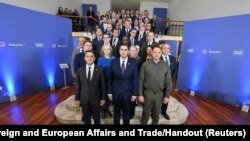A third round of Ukrainian-backed peace talks opened in Malta on Saturday with representatives from more than 60 countries but without Moscow, which condemned it as a "blatantly anti-Russian event."
Ukrainian President Volodymyr Zelenskyy addressed the first of two days of closed-door talks among national security and policy advisers, which he hopes will drum up support for his 10-point plan to end the war.
In a statement on social media, he said 66 countries had taken part in the talks, proof that his plan "has gradually become global."
It follows similar meetings in Jeddah and Copenhagen this summer, with the Ukrainians hoping to eventually hold a summit at the level of heads of state.
"The meeting confirmed the broad interest and increasing support for the key elements of Ukraine's Peace Formula," an EU official said Saturday.
Against the backdrop of the Hamas-Israel war, it also showed "that restoration of just peace is important beyond Ukraine, it is about a global plea for respect of international law," the official said.
Russian spokesperson calls event 'anti-Russian'
Russian foreign ministry spokesperson Maria Zakharova, however, has dismissed the Malta talks as a "blatantly anti-Russian event."
They had "nothing to do with the search for a peaceful resolution," she said on Thursday.
Participants in Malta included the United States, the EU and Britain, staunch supporters of Kyiv following Russia's February 2022 invasion.
Turkey, which has offered itself as a mediator between Ukraine and Russia, was also represented, according to a list seen by AFP before the talks opened.
So too were South Africa, Brazil and India, all members of the influential BRICS bloc, which also includes Russia.
South Africa and India have not condemned Russia's invasion, while Brazil has refused to join Western nations in sending arms to Ukraine or imposing sanctions on Moscow.
China, which insists it is neutral and refuses to criticize the invasion, did not attend, despite being present in Jeddah in August, according to the EU official.
Organizers were hoping for a joint statement from the Malta summit, after both previous meetings ended without a final declaration.
Talks address territorial integrity
Andriy Yermak, the head of Ukraine's presidential office, said on Telegram that the discussions on Saturday were lively and focused on five key areas, notably the issue of Ukraine's territorial integrity.
Zelensky's peace plan calls for Russia to withdraw all its troops from Ukraine's internationally recognized borders, including from the territory of Crimea, which it annexed in 2014.
Russia, which claimed last year to have annexed the four Ukrainian regions of Lugansk, Donetsk, Kherson and Zaporizhzhia, has rejected any settlement that would involve giving up land.
The Malta talks are also looking at nuclear security, notably the need to ensure the safety of the Zaporizhzhia nuclear power plant, and how to protect Ukraine's energy infrastructure as winter approaches.
The issue of food security was also on the agenda, as Russia blocks grain exports from Ukraine, as well as humanitarian issues, including the release of prisoners and the return of Ukrainian children taken to Russia.




